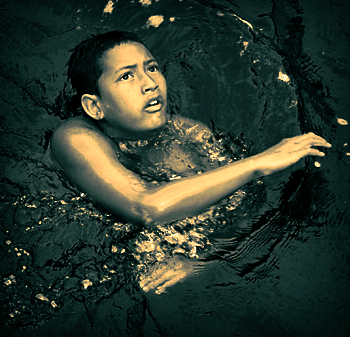Maori
songs - Kiwi songs
- Home
These are
from Ko nga Moteatea me nga
Hakirara o te Maori, published
in 1853.
If you used any of these chants when you were
young, or if similar ones are still being used
today, please email me.
Thanks, [email protected]
|
Na te Ngati
Awa.
He karakia tamariki,
me ka haere ki te kaukau.
E whiti, e whiti, e taku ra
E para, e para, e taku ra
To tupuna, i ho mai,
i te rangi i tua. |
From Ngati Awa.
The wish of a child
when going for a swim.
Shine, shine, oh my sun
Turn bright yellow, oh my sun.
Your ancestor, call him
from the far side of the sky. |

Na
Otakou.
He karakia tamariki
me ka here ki te kaukau.
Upoko,
Upoko,
Whiti te ra,
Hei kai mau,
te kutu o taku upoko,
Upoko,
Upoko,
Whiti te ra. |
From
Otago.
The wish of a child
when going for a swim.
On my head,
on my head
may the sun shine.
so that he can eat
the nits on my head.
On my head,
on my head
may the sun shine.
|
Children's karakia were
composed to interest and amuse children and had no
religious significance.
He whekiki tamariki,
me ka waruhia te upoko.
Moremore tākiki:
Moremore tākaka
I te waruhanga,
A te mata koito,
Kōataata
I taku ipu whakairoiro. |
A children's teasing chant
when the head is shaved.
Stroke the crewcut.
Stroke the bristles.
After the scraping
the face is smoothed.
There's quite a
shadow
on my patterned calabash. |
Tākīki =
tākihikihi = Stripped bare, cropped short.
Tākaka, fibres in fern root. =>
mākaka, curly, bristly
|
He
waiata kai na nga tamariki.
Ko wai kei Puketi? Rara.
Tenei taku kaki,
E tamina noa nei.
Ki tana kai, he whakahiku,
Ki tana kai, he whakangako;
Kotia i runga,
Kotia i raro,
Kotia i te rehe,
o te kakī o Waipuapua;
Nawai, nawai, kawa,
Nawai, nawai, reka.
I kainga ai,
hapukuria. |
A
food song for children
Who is Puketi? Gark-ark!
Here's my throat
longing for a free go.
at his food, so much of it;
at his food, so lavish.
Slices from on top
Slices from below,
Slices from the wrinkle
of the nectar-maiden's neck.
A series of
plain foods
A series of
sweet foods.
When its all
eaten,
we'll look pregnant. |
Rarā
= Gargle sound
Rara = Rush in
The wrinkle of the nectar-maiden's neck
(metaphor)
= an utterly delicious and almost
unattainable delicacy.
He
karakia tamariki
E rere, e rere, e te kotare,
ki runga, ki te puwharawhara;
Ruru ai, o parirau.
Ka mate koe, i te ua.
Tihore mai, i uta,
Tihore mai, i tai;
He rangi, ka maomao
Mao mao, mao te ua. |
The
wish of a child
Fly, fly, O kingfisher,
up to the Astelia bush.
close your wings.
You'll be killed by the rain.
Clear off from the land.
Clear off from the sea.
The heavens are clear,
Far, far, far away has the rain gone.
|
Te Kotare - The Rainbird
"Tangitangi ana te kotare e whakamohio e
āwhā e tata mai ana."
The
kingfisher's calling tells us a storm is
coming closer.
3-part
karakia structure
Notice how E Rere
follows the classic 3-part karakia structure;
the first part acknowledging the great forces
connecting us to the atua or the spiritual
powers, the second expressing a loosening of
these forces' harmful bonds, and the third
section the strengthening
of the helpful forces fpromoting
oneness with the atua.
Upoko, upoko, whiti te ra.
This phrase is a refrain in early Maori voyaging
chants, such as this one used by Taukata and
Hoaki when Kura-whakaata found them lying
exhausted on a beach near Whakatane. They had
been shipwrecked at the end of a long voyage
bringing kumara from Hawaiki.
Upane!
Kaupane!
Whiti te ra!
Tenei to wahine te aitia nei,
E te ngarara nunui,
e te ngarara roroa.
Upoko! Upoko!
Whiti te ra!" |
We’re
still together!
May the sun shine
on us!
This is the woman sired here
by the great chief,
the overlord.
On our heads, our heads!
May the sun shine
on us!
|
It also appeared in the version of Ka Mate
collected for Governor Grey in the early 1850s
where it was referred to as one "...of the
ancient poems of the New Zealanders.....fast
passing out of use, so ancient and highly
figurative was the language in which they were
composed.”
Ka mate, ka mate;
Ka ora, ka ora
Ka mate, ka mate;
Ka ora, ka ora
Tenei te tangata puhuruhuru,
Nana i tiki mai, whaka-whiti te ra
Upane, upane, upane, kaupane
Whiti te ra!
Upoko, upoko, upoko,
Whiti te ra! |
|
|